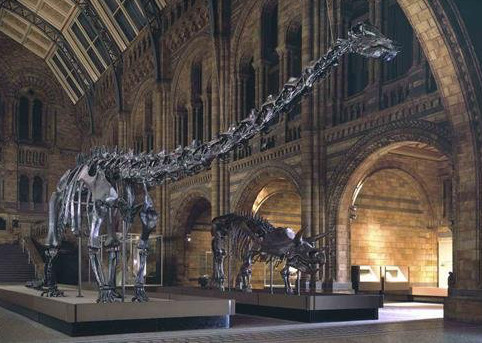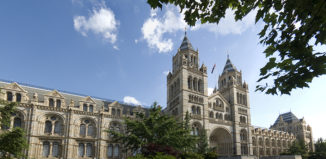Blue Whale skeleton to replace iconic Diplodocus as Natural History Museum central display
The installation of a 25.2m Blue Whale skeleton will be part of a complete re-display of the Natural History Museum’s Hintze Hall that will help to relay the relationship between humans and the natural world.

Diplodocus. © The Trustees of the Natural History Museum, London
For the past 35 years, visitors to the Natural History Museum’s Hintze Hall have been greeted by a cast of a Diplodocus skeleton affectionately known as ‘Dippy’. However, this iconic dinosaur cast is set to be replaced by the vast skeleton of a Blue Whale from summer 2017.
While planning the whale’s move from its current home in the mammals gallery, the Museum is exploring how the Diplodocus cast can be enjoyed by an even wider audience in the long term.
The Museum’s collection is one of the world’s greatest scientific resources for understanding the natural world. This marks the beginning of a decade of transformation for the Museum that will see it change how it creates and shares its scientific research and how the collection is developed and displayed for future generations.
Since this whale skeleton came to the Museum in 1891, Blue Whales have been hunted to near extinction before starting to recover their numbers after they gained protected status.
Director of the Natural History Museum, Sir Michael Dixon, comments: “As the largest known animal to have ever lived on Earth, the story of the Blue Whale reminds us of the scale of our responsibility to the planet. This makes it the perfect choice of specimen to welcome and capture the imagination of our visitors, as well as marking a major transformation of the Museum.
“This is an important and necessary change. As guardians of one of the world’s greatest scientific resources, our purpose is to challenge the way people think about the natural world, and that goal has never been more urgent. The very resources on which modern society relies are under threat. Species and ecosystems are being destroyed faster than we can describe them or even understand their significance. The Blue Whale serves as a poignant reminder that while abundance is no guarantee of survival, through our choices, we can make a real difference. There is hope.”





